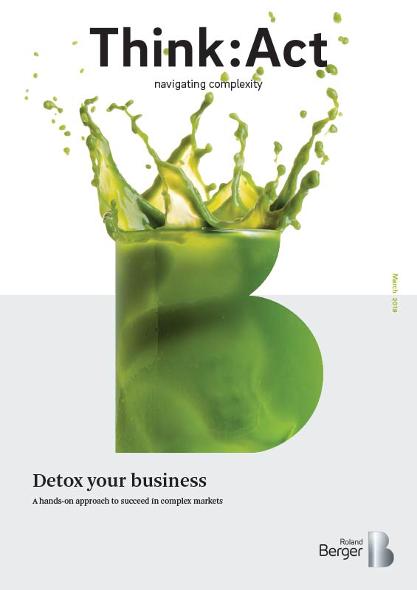Detox your business: Keep it simple, stupid
![{[downloads[language].preview]}](https://www.rolandberger.com/publications/publication_image/roland_berger_493_detox_your_business_cover_1_download_preview.jpg)
Detox your business: Simplification is the ideal way for companies to equip themselves for a future shaped by volatile and complex markets.


Trends are changing at an ever faster pace. Customers' demands never stop growing. And the market is becoming an ever more confusing place. No wonder there is a growing yearning to dial down the complexity. Indeed, we believe that simplification is just what companies need: With a business characterized by simplicity, you can be as close as possible to your customers while simultaneously operating at maximum efficiency. And you have the greatest chance of business success even in turbulent times.

No doubt we are all familiar with the phenomenon: You want to book a trip, you go online – and you are immediately dazzled by the abundance of offers. You start to wonder, isn't there a flight at a more convenient time? Or maybe a cheaper deal on the hotel? Each additional option throws up new questions. Many people seem to feel so overwhelmed by it all that they end up not booking a trip at all: A Google survey found that more than one in every two people felt they were bombarded with too much information to be able to make a travel decision.
This example is symptomatic of our time – and of three trends that companies around the world are struggling with. First, markets are becoming increasingly volatile, with rising innovation rates, new technologies and falling barriers to market entry rocking the boat wherever you look. In the past, a company could go decades without a takeover bid or the urge to swallow another firm, but now corporate acquisitions and mergers are the order of the day.
The second global trend is the rise in what consumers expect in terms of service and prices. The greater the transparency and the more that's available on the market, the more important it becomes to offer a positive customer experience if you want to keep the customer coming back. Successfully mastering this seems like an almost impossible task, because consumers want more products and more service at the same time as more simplicity and more personalized choice. Just as in our travel analogy, you shouldn't simply present your entire portfolio and hope for the best. What you need to do is filter the information based on the customer's personal preferences and past behavior.
The third trend is the transition from value chains to value networks. The more the traditional boundaries between industries and rival firms disappear, the easier it is for new entrants to thrive, especially if they have direct access to customers. Digitalization plays a key role here, in that it changes corporate cost structures and brings down transaction costs dramatically – both within and between organizations.
These three developments offer great business opportunities. But they also involve risks. For example, if the entry barriers to mass markets fall, incumbent players can quickly lose access to customers. The complexity of large, amorphous networks is confusing to shareholders and suppliers, and customers are unsure who to turn to. Companies often find themselves in a tug-of-war between two strategic objectives: On the one hand, they are keen to make their offering as simple as possible by combining different products and services and acting as a one-stop shop. But this comes at the cost of considerable operational complexity. On the other hand, if they want to want to keep their operations as simple as possible, which means producing cheaply and getting new products to market quickly, they must focus. Yet the more they expand their product offering to serve the maximum number of customers, the more easily replaceable they become.
So the challenge lies in offering customers as much convenience as possible – through simplification – while also bringing down the level of complexity within the company. Adopting a new mindset doesn't go far enough, not on its own. Businesses need a concrete roadmap for simplification on all fronts.
It is important to critically review your value proposition and ask questions:
As part of this process of self-examination, you as a business leader must also consider which sticking points you can eliminate in your products and services or in your customer communications. For example, you can offer products as a service, leasing them instead of selling them. The Marriott hotel chain, for example, has opted for a new direct distribution channel by partnering with Alibaba, giving it access to more than half a billion Chinese customers. Working with a large platform is a popular partnering strategy.
After clarifying your value proposition to customers, you need to take a good, hard look at your operations. Questions to ask include: which activities are absolutely necessary in order to fulfill the value proposition, and which services can we provide ourselves?
In the past, companies were often advised to choose between "make or buy". Today, the alternative is to "master and partner", because the days of the classic value chain are over – we are now operating in a world of value networks. Going forward, it's essential to concentrate on your core business. Partners should handle everything else. The key to successful simplification is to differentiate between core and non-core activities and have a smart partnering strategy in place, because it is this that will stop you being pulled between the poles of conflicting strategies.
The third and final step is to ensure that your company's corporate governance and structures follow the guiding principle of simplification. It's about developing skills and taking them out into the organization. Successful companies frequently operate in networks within their organization. They often have rather "boring" org charts based around centers of excellence. But they work in multi-functional teams that are constantly being adapted to suit new circumstances. Rather than changing the underlying structure, they change their operating script. Simplicity at all levels also means fewer meetings, targets instead of processes, and principles in place of structures.
The bad news is that simplification is not a one-time thing. It's an ongoing task. Markets are in flux, customers are changing, industries are volatile. Companies must be prepared to reinvent themselves over and over. Simplification is the best basis on which to build.

![{[downloads[language].preview]}](https://www.rolandberger.com/publications/publication_image/roland_berger_493_detox_your_business_cover_1_download_preview.jpg)
Detox your business: Simplification is the ideal way for companies to equip themselves for a future shaped by volatile and complex markets.